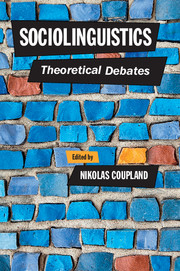Book contents
- Frontmatter
- Contents
- List of contributors
- Preface and acknowledgements
- 1 Introduction: Sociolinguistic theory and the practice of sociolinguistics
- Part I Theorising social meaning
- Part II Language, markets and materiality
- Part III Sociolinguistics, place and mobility
- Part IV Power, mediation and critical sociolinguistics
- Part V Sociolinguistics, contexts and impact
- Part VI The evolution of sociolinguistic theory
- Index
Preface and acknowledgements
Published online by Cambridge University Press: 05 June 2016
- Frontmatter
- Contents
- List of contributors
- Preface and acknowledgements
- 1 Introduction: Sociolinguistic theory and the practice of sociolinguistics
- Part I Theorising social meaning
- Part II Language, markets and materiality
- Part III Sociolinguistics, place and mobility
- Part IV Power, mediation and critical sociolinguistics
- Part V Sociolinguistics, contexts and impact
- Part VI The evolution of sociolinguistic theory
- Index
Summary
I would like to express my thanks to the many people who have shown confidence in this book project and patience in the face of delays in its completion. I had originally envisaged this book as a short review of ‘sociolinguistic theory’, written in my own name. As time went on, and as the field expanded and theory proliferated, I came to realise the impossibility of shouldering even the core of this task myself. It was once possible to argue that there was rather little theoretical ambition in sociolinguistics. Even if originally true – not true any longer!
The project then evolved into one based on ‘theoretical debates’, necessarily so because many of the emerging theory-rich perspectives came from different parts of what I take to be sociolinguistics – the fertile and shifting multi- and interdisciplinary fields of enquiry where language and society come into contact with each other in so many ways. This made any single theoretical vision contentious in its wider context. What was needed, I latterly realised, was to bring as many as possible of the leading researchers into this debate, and I am again grateful that so many of them have been willing to play along.
In the pages of this book many different voices interact with each other, sometimes harmoniously, sometimes less so, but in all cases with importantly distinctive ways of representing what we know in the field of sociolinguists, what we need to know, what we can generalise about, what generalising means, where we are heading, and what next, with a modicum of ‘so what’ thrown in too. In some cases the debates in question have been actual collaborative discussions based around first drafts of the chapters that appear here. Regrettably, I was not able to realise my ambition of circulating all or even most of such drafts around the full set of contributors, theme by theme. Coordinating the timing of different contributors’ writing, and my own, and getting to a finishing line, proved to be enough of a challenge. But a spirit of debate certainly comes through the chapters: All contributors are striving for consolidation and clarification, and often genuine innovation and agenda-setting, and to this extent the book serves as an opportunity to take stock across many of the central fields of sociolinguistic research and to conceive of future developments.
- Type
- Chapter
- Information
- SociolinguisticsTheoretical Debates, pp. xi - xiiPublisher: Cambridge University PressPrint publication year: 2016



